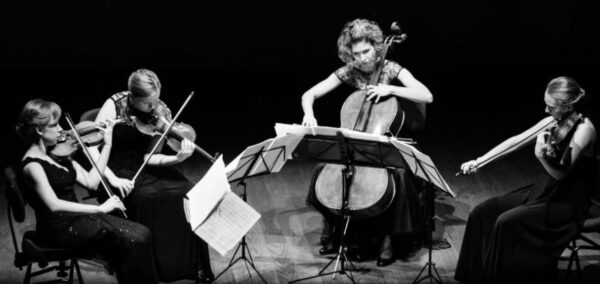Paderewski Festival announces 2021 opening concert

The festival begins on Friday, Nov. 5 at the Park Ballroom in downtown Paso Robles with a program of music by Stanisław Moniuszko, Szymon Laks, and Henryk Wars presented by the Messages String Quartet (pictured).
Festival begins Nov. 5 at the Park Ballroom
– The 2021 Paderewski Festival returns to live concerts, open to the public in various venues in and around Paso Robles, on Nov. 5-7. Paderewski Patrons and Friends of Paderewski passes as well as general public tickets are now available at www.paderewskifest.com.
The festival begins on Friday, Nov. 5 at the Park Ballroom in downtown Paso Robles with a program of music by Stanisław Moniuszko, Szymon Laks, and Henryk Wars presented by the Messages String Quartet. To bring the community of Paderewski Festival supporters together after a year of pandemic-induced closures and to recognize their longstanding and generous patronage, the Board decided to make the Friday, November 5 concert at the Park Ballroom free and open to the public. The Opolo wine reception begins at 7 p.m., the concert at 7:30 p.m.
Stanisław Moniuszko (1819-1872), known as the father of Polish opera and the author of over 300 songs for voice and piano, also wrote two charming string quartets. The Friday night program will open with Moniuszko’s String Quartet No. 1 in D minor, a work written in 1840 in Berlin, where he studied composition. This work is dedicated to Józef Elsner, professor at the Warsaw Music Conservatory and Warsaw University, who was also Chopin’s teacher in the 1820s. The opening theme of the first movement, Allegro agitato is dominated by an expressive dotted rhythm figure closely resembling a motive in Chopin’s F minor Piano Concerto. The second movement, Andantino, has a lovely and simple melody, reminiscent of early Schubert quartets. In the third movement Scherzo, the main theme is a robust example of an attractive Polish mazurka. The finale, Allegro assai, subtitled Un ballo campestre e sue consequenze [A village dance and its outcome], begins with the hajduk, a Highlanders’ dance from southern Poland. This decidedly “folksy” movement winds up Moniuszko’s youthful and attractive work that’s permeated with a uniquely Polish flavor.
Szymon Laks (1901-1983) was a remarkable composer and author, who first studied mathematics and law before entering the Warsaw Conservatory in 1921. By 1925 he had left Warsaw for Vienna, where he worked as piano accompanist for silent films and then moved to Paris to study at the Conservatoire. Founder of the Young Polish Musicians’ Association in Paris, Laks permanently settled in France in 1929. He was arrested by the Nazis in 1941 and deported to Auschwitz in 1942. Laks survived the Holocaust by being appointed the head of the concentration camp orchestra. His first two string quartets are lost, but his String Quartet No. 3—a four-movement work written in 1945 and subtitled “On Popular Polish Themes”—is based on Polish folklore and contains some of the music Laks performed with his orchestra at Auschwitz. This four-movement work opens with a lively Allegro quasi presto which immediately digs into a lively oberek, a fast form of the mazurka. The slow movement, Poco lento, sostenuto, settles into a long and wistful melody that receives rich support from all lower strings. The third movement, a short and convivial scherzo marked Vivace non troppo is a quick round dance built around string pizzicatos with only occasional asides from bowed strings. The last movement, Allegro moderato, giusto becomes a swirling dance with each instrument intoning a tune and provoking a robust response from the rest of the ensemble until, finally, the entire group settles on the original idea of a triumphal march echoing the jaunty music from Poland’s Tatra Mountain highlands.
Henryk Wars (1902-1977), also known in the U.S. as Henry Vars, was a prolific film composer in Poland in the 1930s and in the United States from the 1950s until the early 1970s. Many of the hit songs from his Polish films are still popular today and string quartet arrangements of the two most famous, Miłość Ci wszystko wybaczy [Love forgives all] from the film, Szpieg w masce [Masked Spy] and Ach, jak przyjemnie [Gee, It’s so nice!] from the film, Zapomniana melodia [Forgotten melody] will be heard at the Park Ballroom Messages concert. The American songs by Vars presented on this occasion will include Good Love from the 1956 feature, Seven Men from Now, and the title song from the 1963 film, Flipper.
The Messages String Quartet (Małgorzata Wasiucionek and Oriana Masternak, violins; Maria Shetty, viola and Beata Urbanek-Kalinowska, cello) was founded in Kraków in 2014. Only a year later they won the Second Prize, Silver Medal and a Special Award for interpretation of Shostakovich’s Quartet in the Second International Competition of Chamber Music in Plovdiv, Bulgaria. In 2016 Poland’s Ministry of Culture and National Heritage awarded the Messages a Young Poland Scholarship Program Grant enabling the ensemble to record the Complete String Quartet by Szymon Laks for DUX in 2017. Building on their pioneering recording of chamber music by Philip and Xaver Scharwenka, the Messages’ Laks album received excellent reviews in the French, German, British, American and Polish press.
The Messages Quartet’s mission is to promote chamber music by the lesser-known and emerging contemporary composers. The Quartet’s repertoire includes works by Grażyna Bacewicz, Szymon Laks, Stanisław Moniuszko, Andrzej Panufnik, Karol Szymanowski, and Mieczysław Weinberg alongside standard repertoire of string quartet masterpieces.
Members of the Messages Quartet graduated from Chopin Music University in Warsaw and Kraków Music Academy. They completed their postgraduate soloist studies and master courses at leading European universities, including Paris, Brussels, Vienna, and Stuttgart. Besides their concert activities, the Messages are on the faculty at the Academy of Music in Katowice and Kraków. They also regularly collaborate with the National Polish Radio Symphony Orchestra in Katowice, the Beethoven Academy Orchestra and Sinfonietta Cracovia.
Praised by Le Monde for the “precise and refined quality of their playing” and described by Lynn René Bayley in The Art Music Lounge as, “playing with plenty of energy … what a pleasure it is to just bask in their sound!” the Messages String Quartet performs throughout Europe to a universal and well-deserved acclaim. Their appearances at the 2021 Paderewski Festival and in the Bay Area represent the Quartet’s American debut. The Messages’ latest recordings of Andrzej Panufnik’s and Stanisław Moniuszko’s quartets solidify and further amplify the Ruch Muzyczny review stating that, “Messages Quartet … is undoubtedly a new power on the Polish quartet stage and must be observed.”
Ticket details
▪ Opening Concert (Friday, Nov. 5 | 7 p.m. wine reception, 7:30 p.m. concert): Free admission, RSVP required.
▪ Youth Competition Winners’ Recital (Saturday, Nov. 6 | 5:00 p.m.): Free admission, RSVP required.
▪ Gala Concert (Saturday, Nov. 6 | 7 p.m. wine reception, 7:30 p.m. concert): $35 general public/$10 students.
Saturday meal options: $60 per person (food only); $75 per person (food and wine). Free to Friends of Paderewski and Paderewski Patrons.
Festival Passes: Friends of Paderewski: $250. Includes priority seating at all events, complimentary food and wine on Saturday, Sunday private brunch, and guaranteed space should the audience size be limited due to any changes in SLO County health regulations. Paderewski Patrons: $500. Includes all of the above amenities, plus an exclusive dinner with the Gala artist on Friday night. The 2021 Festival Pass pricing remains unchanged from previous years..
For more information, go to www.paderewskifest.com, email paderewskifestpaso@gmail.com, or call (805) 235-5409.



















